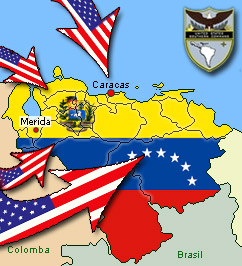
In my article ”Colombia, a threat?,” dated November 28, 2018, I maintained that “in Venezuela, not only has a matrix of opinion strengthened against military intervention, an ethically irrefutable position, but it is considered impossible that it will happen. I have rejected that analysis, decisively, as excessively optimistic and naive because there is a situation that needs to be considered: The decision for military intervention belongs to the governments and people of nations that consider the conduct of the Venezuelan government to be a grave threat to their national interests. It is an illusion of some opposition sectors and slander from the pro-government political forces to argue that a democratic leader can influence that decision. In truth, that falsehood seeks to justify the immense failure of the Bolivarian Revolution.”
The recent statements from Secretary of State Mike Pompeo in relation to Venezuela and China cannot be taken lightly: “We are all concerned about China and the way that China enters countries. … The Maduro regime must restore democracy … the current situation is intolerable. The people of Venezuela are suffering. … We worry. We know we’ve had migration into Argentina, into other countries here, people fleeing this despot, this dictator in Venezuela. And so I don’t have anything specific that I can share with you today, but the determination for all of the countries in the region to join hands with the United States to restore democracy remains strong.” I am very sure that such an unequivocal declaration before the leading industrial nations demonstrates a rejection by the United States of the strong presence of China in Latin America, particularly in Venezuela.
This statement is in complete agreement with the position of Gen. James Mattis, secretary of defense, who declared last August during his visit to Brazil, Argentina, Chile and Colombia, “The United States is deeply concerned about the presence of the People’s Republic of China in Latin America and perceives it as part of the global dispute with the Asian giant.”* Indeed, our country became, as of 1971, a space for geopolitical conflict between the two Chinas. Those were times when China maintained close relationships with some Maoist parties and Taiwan strengthened trade and financial relationships with an important number of our countries. However, when the United Nations decided to admit Communist China as a member and remove Taiwan’s status, the degree of international influence began to change. The Trump government has to be analyzing in detail the presence of important Chinese interests. Our country has particular conditions to transform itself into the fundamental axis for the Chinese policy of expanding trade and financial interests in Latin America.
The Maduro government’s position of delivering basic aspects of our economy to China, in the middle of unacceptable lack of transparency, raises concern for the U.S. and for Venezuelans. Of course, Madurists will argue in their defense that Venezuela is an independent, sovereign state whose foreign policy can strengthen relations with China, Russia, Turkey, Iran and North Korea if that is what is best for national interests. That is precisely the problem. These allies, all of them totalitarian governments, only seek to satisfy the personal ambitions of Nicolas Maduro without contributing anything toward solving our society’s huge problems.
The reprehensible thing about that particular relationship with China is that Maduro does not consider how his actions permanently aggravate our tragedy. It is inexcusable that, by satisfying the national interests of Cuba, Venezuela becomes a little pawn of Chinese policy in Latin America and exposes Venezuelans to serious restrictions, a product of a useless conflict that Venezuelans have no interest in. History does not repeat itself because social, political and economic realities change over time. Anyways, it is worth reminding the powers that back Madurismo, such as the National Armed Forces, about the Soviet missile crisis in Cuba in 1962. No one can forget that as tensions increased, with the clear threat from the U.S. of using their superior military capacity, negotiations between John Kennedy and Nikita Khrushchev occurred without taking Cuban interests into account, much less Fidel Castro’s opinion.
In spite of everything, I have the impression that Maduro’s untimely trip to Russia to procure more military, political and economic support could have been prompted by China’s rejection of radicalizing its confrontation with the United States, because a geopolitical confrontation in Latin America with the greatest military power in the world is contrary to [Chinese] long-range foreign policy and [Chinese] national interest. It is possible that the international circumstances for Russia, in an ongoing dispute with Europe and NATO over the Crimean peninsula, allows it some ability to act. However, Venezuelans and, essentially, the military leadership, must understand that Russia is much weaker in all areas than the Soviet Union and cannot support the totally illegitimate Maduro government, either economically or militarily, after Jan. 10, 2019, if its adventurous foreign policy compromises U.S. vital interests and President Trump sees himself as obligated to respond.
Consequently, it is necessary to ask: Is the U.S. a military threat to Venezuela? I have no doubt saying that it is, because there are enough international circumstances that place U.S. national interests in Latin America in grave danger, as high-ranking government officials have already expressed, not only in the context of their geopolitical influence in the region, but also in the existing risk to security in the hemisphere due to unpunished exportation of organized crime, the consent from our authorities for terrorist organizations to operate in national territory and the threat from our unstoppable diaspora which compromises the interests, mainly, of Latin American countries. What Venezuelans cannot ignore is that if there is a backlash against Venezuela, history will hold Maduro largely responsible due to his excessive ambition for power and his totalitarian mentality.
*Editor’s note: The original quotation, accurately translated, could not be verified.

Leave a Reply
You must be logged in to post a comment.